Filed in
Conferences
 Subscribe
Subscribe to Decision Science News by Email (one email per week, easy unsubscribe)
ACR 2006. ORLANDO. SEP 28-OCT 1. NO SUNDAY. DEADLINE: MARCH 17.
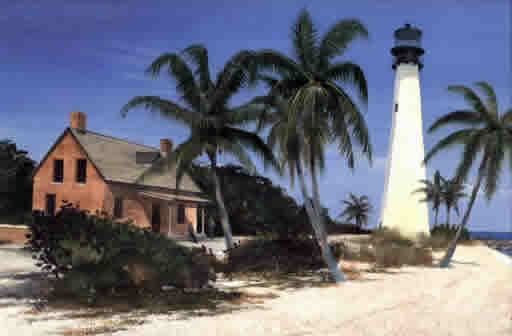
The 2006 North American Conference of the Association for Consumer Research will be held at the Renaissance Orlando Resort at Seaworld in Orlando, Florida, from Thursday September 28 through Sunday October 1, 2006.
As in past years, the conference will provide a multi-topical forum for scholarly presentations, discussions, and collaborations on consumer behavior. However, the format of this year’s conference will be slightly different from previous years. The opening reception will take place on Thursday evening as usual. However, in a shift from previous ACR conferences, regular presentation sessions will take place only on Friday and Saturday, with Sunday being reserved for research meetings, informal discussion of sessions, etc. Please note Sunday is still an official scheduled conference day.
Additional specific information on submissions of special sessions, competitive papers, working papers, roundtables, and films is provided below.
PROGRAM STRUCTURE
As in the recent past, there will be five main forums for the presentation and discussion of research and scholarly thought.
Special Topic Sessions: provide opportunities for focused attention on cutting-edge and important topics. Successful sessions offer a coherent perspective on emerging substantive, theoretical, or methodological issues.
Competitive Paper Sessions: include papers that represent the completed work of their authors. The ACR conference co-chairs assign accepted papers to Conference sessions that reflect similar scholarly interests.
Working Paper Track: Participants typically present preliminary findings from the early stages of a research program. Authors distribute their papers and display their findings poster-style in a plenary session.
Roundtables: Encourage intensive participant discussion of consumer research topics and issues.
Film Festival: presents edited video recordings on topics related to consumer behavior. This year’s Film Festival theme is “Making an Impact.”
SUBMISSION AND DECISION DEADLINES
Submissions for competitive papers, working papers, roundtables, and special topic session proposals must be received no later than Friday March 17, 2006. Notification of acceptance in these four categories will be made by Friday July 14, 2006. The entry deadline for Film Festival submissions is Friday June 30, 2006. Notification of accepted films will be Monday July 31, 2006.
To give as many people as possible the opportunity to participate in ACR 2006, note the requirement that each ACR participant may present in Special Topic and/or Competitive Paper sessions no more than twice during the duration of the conference.
Call for papers
A BRIEF HISTORY OF DECISION MAKING

The January 2006 Harvard Business Review provides a managerially oriented summary of the history of decision making, including the concept of “fast and frugal” reasoning, coined right here at Decision Science News.
Quote:
“The study of decision making, consequently, is a palimpsest of intellectual disciplines: mathematics, sociology, psychology, economics, and political science, to name a few. Philosophers ponder what our decisions say about ourselves and about our values; historians dissect the choices leaders make at critical junctures. Research into risk and organizational behavior springs from a more practical desire: to help managers achieve better outcomes. And while a good decision does not guarantee a good outcome, such pragmatism has paid off. A growing sophistication with managing risk, a nuanced understanding of human behavior, and advances in technology that support and mimic cognitive processes have improved decision making in many situations.
Even so, the history of decision-making strategies is not one of unalloyed progress toward perfect rationalism. In fact, over the years we have steadily been coming to terms with constraints–both contextual and psychological–on our ability to make optimal choices. Complex circumstances, limited time, and inadequate mental computational power reduce decision makers to a state of “bounded rationality,” argues Simon. While Simon suggests that people would make economically rational decisions if only they could gather enough information, Daniel Kahneman and Amos Tversky identify factors that cause people to decide against their economic interest even when they know better. Antonio Damasio draws on work with brain-damaged patients to demonstrate that in the absence of emotion it is impossible to make any decisions at all. Erroneous framing, bounded awareness, excessive optimism: the debunking of Descartes’s rational man threatens to swamp our confidence in our choices, with only improved technology acting as a kind of empirical breakwater.
Faced with the imperfectability of decision making, theorists have sought ways to achieve, if not optimal outcomes, at least acceptable ones. Gerd Gigerenzer urges us to make a virtue of our limited time and knowledge by mastering simple heuristics, an approach he calls “fast and frugal” reasoning. Amitai Etzioni proposes “humble decision making,” an assortment of nonheroic tactics that include tentativeness, delay, and hedging. Some practitioners, meanwhile, have simply reverted to the old ways. Last April, a Japanese television equipment manufacturer turned over its $20 million art collection to Christie’s when the auction house trounced archrival Sotheby’s in a high-powered round of rock-paper-scissors, a game that may date back as far as Ming Dynasty China.”
Source:
Buchanan, L., O’Connell, A., (2006). A brief history of decision making. Harvard Business Review, 84(1)
THE DISTRIBUTION BUILDER
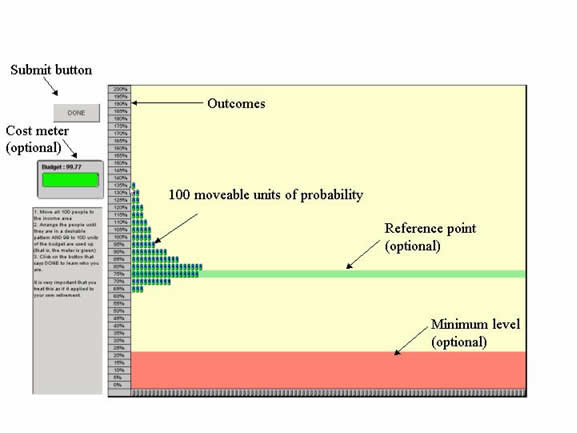
To download a video, click on the image (6.7MB AVI).
The Distribution Builder is a tool that lets people specify the probability distributions of risk they would like to have apply to their own future. Think about using it to choose the outcomes you’d like to see from your investments, insurance policies, and medical procedures. Read about it here:
Goldstein, D. G., Johnson, E. J., & Sharpe, W. F. (working paper). Measuring Consumer Risk-Return Tradeoffs. Coming soon to a journal near you.
FAQs
Can I see a video of the Distribution Builder?
Yes, click on the image above to download.
Can I show a video of the Distribution Builder to my class?
Yes, this video may be used for non-commercial purposes, as detailed in the Creative Commons License on the main page of this site.
I need to gather distributions from people for an experiment I am running. Can the Distribution Builder do that?
Yes, the Distribution Builder can be used to elicit any kind of distribution, constrained or unconstrained.
I want to study people’s preferences for two-alternative gambles, can the Builder do that?
Yes, the current Distribution Builder can display between 2 and 100 units of probability.
I want to have people create gambles they see as equivalent to other gambles, given constraints. Can it do that?
Yes, the Distribution Builder can be set such that any number of the markers are fixed in place.
Is the Distribution Builder publicly available?
We hope to make the basic GUI framework available in the future, with no promises as to when that will be. Watch this site for more information.
Filed in
Conferences
 Subscribe
Subscribe to Decision Science News by Email (one email per week, easy unsubscribe)
2006 Behavioral Decision Research in Management Conference
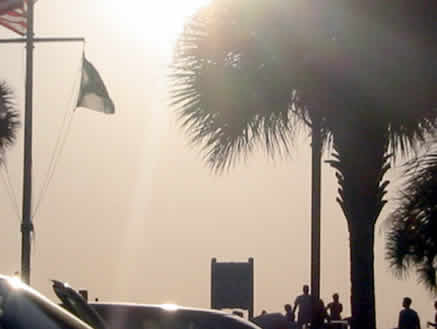
The 2006 Behavioral Decision Research in Management Conference will be hosted by the UCLA Anderson School of Management.
Local Organizing Committee
Shlomo Benartzi |Conference Coordinator
Craig Fox | Program Chair
Kristin Diehl | USC
Sanjay Sood | UCLA
Organizing Committee
Colin Camerer | Caltech
Rachel Croson | University of Pennsylvania
Joel Huber | Duke University
Eric Johnson | Columbia University
Thomas Langer | University of Muenster
Lisa Ordóñez | University of Arizona
Maurice Schweitzer | University of Pennsylvania
Richard Thaler | University of Chicago
George Wu | University of Chicago
Chair, Teaching Pre-conference
J. Frank Yates | University of Michigan
Chair, Tversky Symposium
Eldar Shafir | Princeton University
Webmaster (Submissions & Review)
Alan Schwartz | University of Illinois at Chicago
Loew’s Santa Monica Beach Hotel
June 15-18, 2006
Submission deadline: March 1, 2006
COLLABORATIVE & MULTIDISCIPLINARY RESEARCH 2ND ANNUAL CONFERENCE

Yale Center for Consumer Insights at the Yale School of Management
May 4-6, 2006
Deadline for Submitting Abstracts: February 1, 2006
Abstracts are invited for the 2nd annual conference to be held at the Yale School of Management on May 4 – 6, 2006. This year’s conference, sponsored by the Yale Center for Customer Insights and the Marketing Science Institute, is to commemorate and honor Dick Wittink’s commitment to multidisciplinary and collaborative research, and his belief that there is great value in gathering together scholars and practitioners who are collaborating on rigorous and relevant research.
The inaugural conference, held last year from December 10-12, 2005 had over 100 attendees, with one third executives and two third academics. Participants included people from all over the US and representing over forty schools. Corporate representation included IBM, Intel, P&G, Coca Cola, CVS, Lufthansa, and Dream Works Pictures. The conference was also attended by people from other countries such as Holland, Germany, England, Belgium, Switzerland, Australia, and Singapore.
Abstracts on any of the following topics are welcomed:
*Behavioral Decision Theory
*Competition
*Consumer Preference Measurement
*Health Care
*ROI Based Marketing
*Scanner Data & Econometric Modeling
Abstracts should be two pages, double-spaced. They will be reviewed by the conference committee comprised of Ravi Dhar, Subrata Sen, and K. Sudhir (Yale); Pradeep Chintagunta, (Chicago); Peter Leeflang, (Groningen); David Reibstein, (Wharton); and Naufel Vilcassim, (LBS).
Conference sessions of ninety minutes each will allow for the presentation of three papers. Abstracts should be sent to Eugenia.hayes at yale.edu by February 1, 2006. Presenters will be notified by March 1, 2006.
The registration fee is $200. The registration form can be downloaded from our website www.cci.som.yale.edu.
The registration deadline is April 1, 2006. Presenter’s registration fee, travel, and hotel expenses will be paid by the Yale Center for Customer Insights.
DSN is fanatically committed to interdisciplinary research.
Filed in
Jobs
 Subscribe
Subscribe to Decision Science News by Email (one email per week, easy unsubscribe)
POSTDOCTORAL TRAINEESHIP IN QUANTITATIVE METHODS: UNIVERSITY OF ILLINOIS AT URBANA-CHAMPAIGN
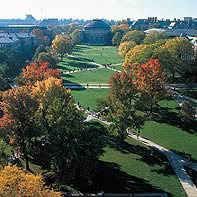
NIMH funded training in quantitative methods for behavioral and social science. Appointment commences July or August 2006. Seminars on advanced topics include; combinatorial methods for data analysis, decision theory, mathematical psychology, multidimensional scaling, multivariate analysis, and social choice modeling. Opportunities for both methodological and applications research. Faculty includes: C. Anderson, D. Budescu, H. Chang, J. Douglass, S. Hong, L. Hubert, A. Klein, J. Meulman, G. Miller, M. Regenwetter, B. Roberts, J. Spencer-Smith and M. Wang. Stipend range: $35,568 to $41,796. Applicants should be US citizens or have been admitted for permanent residence. Funding limits appointments to individuals who are no more than two years post-PhD.
Curriculum Vitae, statement of research interests, reprints, and three letters of recommendation should be sent to: Prof. Michel Regenwtter, c/o Kim Mallory, NIMH Training Program in Quantitative Psychology, Department of Psychology, University of Illinois, 603 E. Daniel, Champaign, Illinois 61820. e-mail: regenwet at uiuc.edu Submissions must be received by February 28, 2006.
DSN can vouch that some very good people have gone through this postdoc program.
Filed in
Conferences
 Subscribe
Subscribe to Decision Science News by Email (one email per week, easy unsubscribe)
THE EDWARDS BAYESIAN RESEARCH CONFERENCE
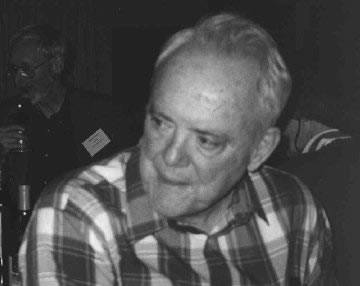
Photo by Jim Shanteau
Ward Edwards, one of the main founders of the field of behavioral decision making, hosted the Bayesian Research Conference annually since 1961. For many years the conference was held in Studio City, CA, near Wardâs home. It is now hosted by Michael Birnbaum and Jie Weiss, JDM members from Cal State Fullerton, and has been moved to their campus. With the passing of Ward in 2005, we are honoring him and flattering ourselves by henceforth attaching his name to the conference.
The conference will take place January 12-13, 2006 in Fullerton, California
Features of the Edwards Bayesian Research Conference:
1) An intimate, friendly two-day meeting with no parallel sessions, lots of time for informal discussion, and low registration fee ($50). Sessions meet on the campus of Cal State Fullerton; excellent rates ($89 including breakfast and a Jacuzzi in every room) are available at the nearby Chase Suites.
2) An eclectic program. The label “Bayesian” was actually more narrow that the conference. Although there have always been talks about Bayesian analysis and reasoning, the talks in recent years have covered a wide variety of topics in both theoretical and applied aspects of decision making. Ward was very open-minded, and we will follow that tradition. Ward always asked for people to bring new ideas, even if not fully baked, for him to mull over. Two particular traditions of the Conference are that paper titles will be âimprovedâ to be humorous and that time is allocated for discussion after every presentation.
3) The Conference is held prior to the Martin Luther King holiday weekend, with paper sessions Thursday and Friday. There will also be a reception Wednesday evening in the hotel and a party Friday evening (another of Wardâs traditions) at the nearby home of David and Jie Weiss.
4) Itâs usually warm and sunny in Southern California in January (but there is non-zero utility attached to the umbrella at the bottom of the suitcase). On the Saturday following the conference, there will be a (no-cost) tennis session for those who dare.
5) The Cal State Fullerton campus is easily reached using Super Shuttle or Prime Time Shuttle. The closest four commercial airports are (in order of proximity):
Long Beach (LGB)
John Wayne-Orange County (SNA)
Ontario International (ONT)
Los Angeles International (LAX)
If you are interesting in attending, please see the conference website for further information (http://psych.fullerton.edu/mbirnbaum/bayes/) and a registration form. Please register before December 7, 2005.
Editors note: DSN has been to this conference twice and both times left having made meaningful acquaintances. Call it the small conference advantage.
Filed in
Conferences
 Subscribe
Subscribe to Decision Science News by Email (one email per week, easy unsubscribe)
INTERNATIONAL CORPORATE RESPONSIBILITY CONFERENCE
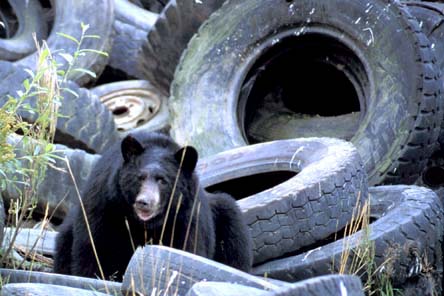
London Business School invites submissions to the third in a series of international corporate responsibility conferences (following the Haas conference in 2005 and the Boston conference in 2003). Topics for inclusion range widely but those of particular interest explore the implications of corporate responsibility, globalization and global business for business and marketing strategy. Research papers can be either empirical or conceptual. A selection of papers presented will be considered for a special issue of the California Management Review.
Abstracts must clearly identify your research question(s) and the actual/proposed methodology used. You will receive notice by January 31st, 2006 as to whether your topic has been selected for inclusion in the conference. Authors of successful submissions will be invited to submit a paper.
Please submit a maximum 500-word abstract of your topic to ncsmith at london.edu
Proposal submission deadline December 31st, 2005.
Topic areas include the following:
Consumer behavior, branding & corporate responsibility
· Brand equity as a driver of attention to corporate responsibility (e.g., how does corporate responsibility affect consumer behavior?)
· Vulnerabilities of global brands to corporate responsibility failures
· Cause-related marketing and corporate responsibility
Marketing mix and corporate responsibility issues
· Socially responsible pricing (e.g., essential medicines)
· Environmental impacts of products and packaging
· Supply chains and ethical sourcing (e.g., preventing sweatshops, supply chain monitoring and compliance)
Developing strategies for corporate responsibility
· Developing corporate responsibility strategies, including auditing the business and formulating corporate responsibility objectives
· Culture-specific interpretations of corporate responsibility, including developing country versus developed-country perceptions of corporate responsibility issues
· Strategies for the âBottom of the Pyramidâ (e.g., business opportunities in poor communities of developing countries, limitations of BOP strategies)
Corporate responsibility organization and management
· âMainstreamingâ corporate responsibility (embedding corporate responsibility in the day-to-day activities of the firm)
· Effective stakeholder engagement (e.g., developing stakeholder engagement skills, differences in stakeholder expectations across countries)
· Employees as drivers of attention to corporate responsibility
Metrics & reporting
· Measuring social and environmental performance of the global firm
· Linking corporate responsibility performance to economic performance and marketing metrics (e.g., sales, market share, brand equity)
· Social reporting challenges (e.g., effective communications, consumer backlash, legal, etc.)
Conference co-chairs:
N. Craig Smith, London Business School C.B. Bhattacharya, School of Management, Boston University David Levine, Haas School of Business, University of California, Berkeley.
The London Business School is grateful to the following sponsors for their financial support of this conference: Aspen Institute, Boston University, California Management Review, the Haas School of Business Center for Responsible Business (University of California, Berkeley), and London Business School.
SOCIETY FOR CONSUMER PSYCHOLOGY SUMMER CONFERENCE: CALL FOR PAPERS

The Society for Consumer Psychology (SCP) will hold its Annual Summer Conference as part of the 114th Annual Convention of the American Psychological Association from August 10-13. SCP (Division 23 of APA) represents psychologists and other consumer researchers working to develop an understanding of issues that might be unique to consumer behavior yet unified by common psychological theories. The SCP conference is a relatively intimate forum, providing opportunities for a high level of interaction among participants interested in integrating psychology and consumer research. The SCP Annual Summer Conference is scheduled to be held in New Orleans.
Original papers (competitive or poster sessions) and special topic sessions are sought for presentation at the conference. We strongly encourage the submission of papers that are conceptually and theoretically rigorous and likely to be of theoretical interest to consumer psychologists and to psychologists more generally. If you need additional information, please visit the APA website at http://www.apa.org/convention06.
Individual presentations & Competitive Papers or Posters
General Information. Individual papers that are submitted will be grouped together by the division program chairperson within the division’s paper programs. If selected, presenters will have approximately 10-15 minutes for oral presentation. Researchers may also submit papers for poster presentations. This format is particularly useful as it allows presenters and attendees to engage in extended discussions regarding the author’s presentation that is in illustrated format on a poster board. If your presentation is accepted for a presentation in a poster session, APA will send detailed instructions to assist you in preparing your materials in the required format. Authors must agree, if the submission is accepted, to publish either the complete paper or an abstract in the Conference Proceedings. At least one author of each submitted paper must agree to register and present the paper at the conference, if it is accepted. Submissions must be received by December 2, 2005.
Submission guidelines. The following materials will be needed to fulfill APA requirements:
* Presentation title (maximum 10 words)
* Complete listing of all authors with advanced degrees and affiliations
* Complete mailing and email addresses of the primary (presenting) author
* Preferred mode of presentation (paper/poster)
* Special speaking accommodation request (e.g., PowerPoint or video usage)
* 500-1000 word summary (in electronic form and ready to be copied/pasted)
* APA membership status (member/non-member)
Special Session Symposia
General Information. A special session is a focused session in which participants present data pertaining to a common theme (e.g., cross-cultural issues, affect, communication-persuasion, automatic processes etc.). Each session consists of 3 presenters and a discussant.
Presenters are given 10-15 minutes to present their research. The role of the discussant is to highlight the essential issues raised and to integrate and interpret them using a unifying theoretical framework. Special topic session presenters are required to publish at least an abstract of their presentations (or entire papers if they prefer) in a Proceedings volume. At least one author of each presentation in the proposal must agree to register and present at the conference, if it is accepted. Submissions must be received by December 2, 2005.
Submission guidelines. The following materials will be needed to fulfill APA requirements:
* Session type (e.g., symposia, panel discussion etc.)
* Program title (maximum 10 words)
* Complete listing of all participants with advanced degrees and affiliations
* Complete mailing and email addresses of all participants
* 300-word general statement of the session’s objective (in electronic form and ready to be copied/pasted)
* 300-word summary for each participant (in electronic form and ready to be copied/pasted)
* Special speaking accommodation request
* APA membership status (member/non-member)
Note: The organizers understand that 300 words may not be sufficient to present your ideas clearly. However, APA requires these summaries for publication in the proceedings. To help them better evaluate your proposal, you can submit an additional document containing a 1000 word summary of the session objective and a 500-1000 word summary for each individual presenter.
How to submit
Submissions can be emailed to thomas_kramer at baruch dot cuny dot edu or llau at merage dot uci dot edu. Please use MS Word attachments and indicate in the subject heading of your email message if the proposal is for an individual competitive paper, a poster session or a special session. An alternative submission method is through the APA electronic web delivery system at
http://apacustomout.apa.org/ConvCall/default.aspx.
The preference is for the former since it allows the organizers to deal with proposals directly and quickly.
Filed in
Conferences
 Subscribe
Subscribe to Decision Science News by Email (one email per week, easy unsubscribe)
2006 INFORMS MARKETING SCIENCE CONFERENCE

The INFORMS Marketing Science Conference is an annual conference that brings together the leading research scholars in marketing, and a small number of individuals from industry and government. The conference falls under the auspices of the INFORMS Society for Marketing Science (ISMS) sub-branch whose major purpose is to foster the development, dissemination, and implementation of knowledge, basic and applied research, and science and technologies that improve the understanding and practice of marketing. At the upper echelon of scholar-focused conferences in business, it is a forum where leading scholars in marketing present the results of their latest research.
The Marketing faculty of the University of Pittsburgh invites you to submit abstracts of your research papers, participate in the conference, and get a feel for the Pittsburgh community.
DSN has always been fond of Pittsburgh, PA, and the Carnegie Mellon Children’s School, of which the DSN editor is an alumnus.
2006 INFORMS Marketing Science Conference Call for papers , Download pdf
The conference runs between the afternoon of Thursday, June 8, 2006, and the evening of Saturday, June 10, 2006. While parallel sessions are planned during the day, the evenings will consist of a reception (Thursday) and an awards dinner (Friday) and a potpourri of optional activities (Saturday). The venue is the Westin Convention Center Hotel in downtown Pittsburgh. Please make reservations at the Westin as Soon as possible.
 Subscribe to Decision Science News by Email (one email per week, easy unsubscribe)
Subscribe to Decision Science News by Email (one email per week, easy unsubscribe)










